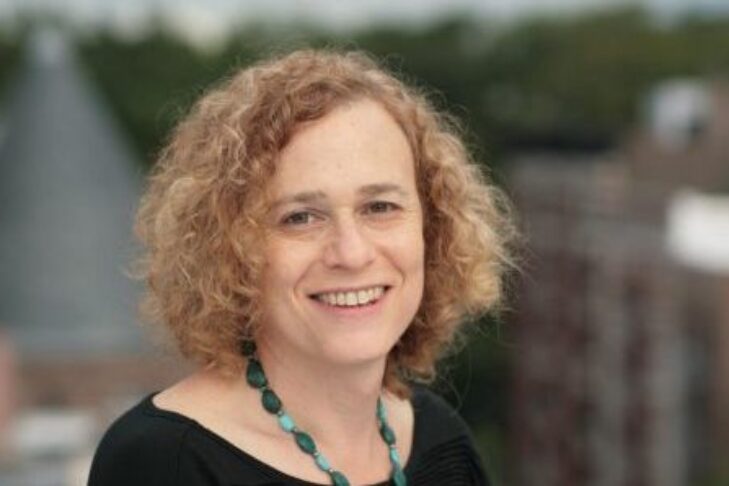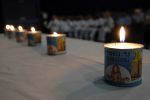I recently turned to one of my favorite poets, memoirists and Torah scholars Joy Ladin and asked her to read a couple of her poems closely with me, as they seem fitting for this uncertain time. (Read my previous Q&A with Ladin here.)
Ladin holds the David and Ruth Gottesman Chair in English at Stern College of Yeshiva University. She’s also the author of several books, including a volume of poems, “The Future is Trying to Tell Us Something: New & Selected Poems,” and a work of biblical interpretation called “The Soul of the Stranger: Reading God and Torah from a Transgender Perspective.”
Most recently, Ladin’s scholarship and wisdom can be heard in her new program on Tuesdays called “Containing Multitudes: Exploring Identity, Religion, Poetry.” The title echoes a verse from Walt Whitman’s “Song of Myself”:
Do I contradict myself?
Very well then I contradict myself,
(I am large, I contain multitudes.)
Ladin said she has always been drawn to the idea that Judaism contains multitudes and contradictions. “Whitman is into something that I think is useful for Jews who struggle to figure out, ‘What does it mean to be Jewish and where do I locate myself in relation to all of this?’” she said. “In this series, I will be talking with people who are different enough from me and different enough from one another that we can have a conversation that shows the creative and exciting as opposed to simply the maddening and frustrating. We can explore the overwhelming aspect of being part of a tradition that is so multitude-ness and so filled with different ways of thinking and being and praying and believing.”
The first poem Ladin and I read together is called “Wrestling,” which she introduced with the following description: “I’m very taken with that image of Jacob wrestling with the angel or the mysterious figure. I worked on this poem for a long time, and it had different meanings at different times of my life. At first, it was very specifically about this terrible relationship I had with my father, and a relationship in which I felt like I was being wounded and I had to fight. But because he had stopped having anything to do with me, I realized I’m the one who is in control here. I’m the one who can’t let go, because if I let go of this internal fight with him, that’s hurting me so much; I don’t have any of him at all, he’s just gone.”
She continued: “I froze the poem at that moment of the battle instead of getting to the part of the conclusion and the blessing. It’s also probably why there are so many ‘I’ sounds. This cry as the pain of the ‘I’ rhymes, and the poem never leaves those sounds; it never finds a more healing sound. As I was entering into gender transition and still working on the poem, it took on a different meaning for me; it related to the sense of terrible isolation I knew I was going into with my family. I knew my relationship with my now ex couldn’t survive gender transition; we talked a lot about it. I, like my ex, was afraid of the children being hurt by my transition. Neither of us wanted that. So, I had a sense that in order to become myself, which was a risky thing, I was going to have to go alone to the other side of the river and fight through whatever I thought.”
“Wrestling”
By Joy Ladin
“And he rose up that night, and took his two wives, and his two handmaids, and his eleven children, and passed over the ford of the Yabbok, and sent them across the river, along with his possessions. And Jacob was left alone; and an angel wrestled with him until daybreak” (Genesis 32:23-25).
You wish you’d stayed on your family’s side.
Not that you’re losing. Not at all.
The angel’s wings snap
in the vice of your thighs.
The angel gropes,
searching out the sinew of light,
the blessing you stole in disguise
from a father who could only love
what he couldn’t recognize. The angel threatens
to kill; to die;
claims to be your father’s God;
your father himself, abashed and blind;
the fear that took his eyes.
You wish you could let him go. Lose
to keep him alive. Dissolving
in the breaking light,
he begs you to let him fly,
his feathers melting,
running down your thigh.
Ladin’s current poetry project is a book-length series called “Shekinah Speaks.” “The Shekinah in Jewish mystical tradition is the feminine aspect of the divine,” said Ladin. “And the tradition imagines her in binary terms, so she has to be the opposite of whatever the male-identified aspect of God is. The male-identified aspect of God gets to do things, and the Shekinah just feels things. She feels what human beings feel. She suffers. She’s the immanent aspect of God, and she doesn’t get to talk, so we don’t know what her voice is. We just know she’s supposed to be there when we rejoice. She’s there when we suffer. She’s there when we go into exile. And God cannot be whole until both the Jewish people return from exile and the Shekinah returns from exile back to God. So, I wanted to know what she has to say.”
She continued: “She’s been a spectator in my psyche. I tried to create a form of composition that would enable me not just to put words in the Shekinah‘s mouth but to allow her language to emerge. The strategy I used for that was to mix two kinds of language that aren’t mine. One was language from God’s monologues in Isaiah, particularly the great ones starting from Chapter 40. I mixed them with words I found in Cosmopolitan magazine articles whose themes resonated with Isaiah’s. I know this sounds improbable; I would mix the words together and wait for a sense and a voice to emerge. I searched for words that didn’t seem like me, but sounded divine, and in particular was language that was making me uncomfortable or summoning me beyond my ways of thinking.”
“Comfort Animal”
By Joy Ladin
From the sequence “Shekhinah Speaks”
“Comfort, comfort my people….”
—Isaiah 40:1
A voice says, “Your punishment has ended.”
You never listen to that voice. You really suck
at being comforted.
Another voice says, “Cry.”
That voice always gets your attention,
keeps you thinking
about withered flowers and withering grass
and all the ways you’re like them.
Hard to argue with that.
Death tramples you, an un-housebroken pet
trailing prints and broken stems,
pooping anxiety, PTSD, depression.
It’s better to be animal than vegetable
but best of all is to be spirit
flying first or maybe business class
with your emotional support animal, your body,
curled in your lap, soaring with you
above the sense of loss you’ve mistaken
for the closest to God you can get.
You want to cry? Cry about that.
Who do you think created
the animals to whom you turn for comfort,
dogs, miniature horses, monkeys, ferrets,
hungers you know how to feed,
fears you know how to quiet?
I form them, fur them,
it’s my warmth radiating from their bodies,
my love that answers
the love you lavish upon them.
Your deserts and desolations
are highways I travel,
smoothing your broken places,
arranging stars and constellations
to light your wilderness.
Sometimes I play the shepherd;
sometimes I play the lamb;
sometimes I appear as death,
which makes it hard to remember
that I am the one who assembled your atoms,
who crowned your dust with consciousness.
I take you everywhere,
which is why, wherever you go, I’m there,
keeping you hydrated, stroking your hair,
laughing when you chase your tail,
gathering you to my invisible breasts
more tenderly than any mother.
You’re right—you never asked for this. I’m the reason
your valleys are being lifted up,
the source of your life laid bare.
Mine is the voice that decrees—
that begs—your anguish to end.
When you suffer, I suffer.
Comfort me
by being comforted.









